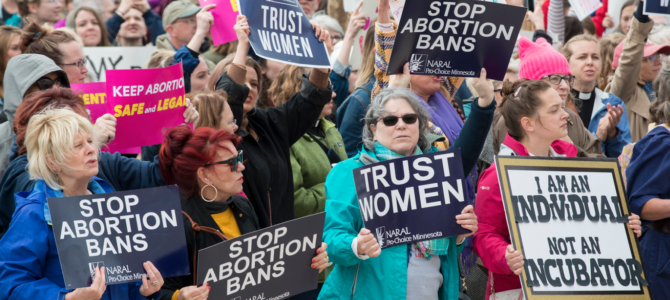
Are Christian medical workers lobbying the United States government to allow them to toss pregnant women out of ambulances onto the street if they require an emergency abortion? According to several federal and district judges, this is such a serious concern, it requires blocking religious and conscience protections entirely.
The May Health and Human Services rule, titled “Protecting Statutory Conscience Rights in Health Care,” was originally scheduled to go into effect nationally today, on Nov. 22, but a New York federal judge prevented this in early November, and a U.S. district judge in Washington state issued a similar ruling shortly after.
In the third ruling, issued this week, U.S. District Judge William Alsup of the Northern District of California stated, “Under the new rule, to preview just one example, an ambulance driver would be free, on religious or moral grounds, to eject a patient en route to a hospital upon learning that the patient needed an emergency abortion,” he wrote. “Such harsh treatment would be blessed by the new rule.”
Alsup cited this example from the prior judicial ruling against the rule by Judge Paul Engelmayer of the Southern District of New York, who presented the following scenario during the hearing:
A pregnant woman takes an ambulance across Central Park to Mt. Sinai Hospital and, midway through, from conversation with the ambulance driver, it becomes clear that she is headed there to terminate an ectopic pregnancy. The driver tells her to get out in the middle of the park, and the employer fires the ambulance driver for that. Is the ambulance driver assisting in performance of the procedure if the ambulance driver takes her to the hospital?
The primary concern was over the phrase “assist in the performance of,” related to a procedure or practice the medical worker morally opposes. The HHS confirmed an ambulance worker would be covered under this phrase and stated, “The rule protects an ambulance driver’s ability not to assist in the performance of a procedure to which the driver has an objection.”
Despite pro-lifers opposing elective abortion, not life-saving measures in an ectopic pregnancy that typically end in the accidental death of the baby, both judges interpreted this to mean the HHS affirmed the above scenario to be a valid example of religious or conscience objection. They were unable to come up with any real-life examples of anything remotely close to this ever happening.
HHS Clarifies Potential Conscience Conflicts
HHS provided more in-depth answers in the rule seemingly not taken into consideration. “For example, the Department believes driving a person to a hospital or clinic for a scheduled abortion could constitute ‘assisting in the performance of’ an abortion, as would physically delivering drugs for inducing abortion.”
It continued, “To the extent commenters are referring to emergency transportation of persons experiencing unforeseen complications after, for example, an abortion procedure, the Department does not believe such a scenario would implicate the definition of ‘assist in the performance of’ an abortion, because the complications in need of treatment would be an unforeseen and unintended byproduct of a completed procedure. Further, the Department is not aware of any entities or medical professionals that would object to treating someone, or transporting someone to treatment, under these circumstances.”
Specifically referencing the hypothetical scenario of the pregnant woman with an ectopic pregnancy, it states, “However, as a general matter, the Department does not believe that mere speculation that an objected‐to service or procedure may occur suffices to establish a specific and reasonable connection between the objected‐to service or procedure and the act of transporting the patient.”
As for refusing to treat LGBT people, the reoccurring argument is, as The Advocate stated, “It could jeopardize the care of transgender people, of HIV-positive people, those taking PrEP, patients seeking abortion or contraception, and more.” The HHS countered the argument of access to care, saying, “Studies have specifically found that there is insufficient evidence to conclude that conscience protections have negative effects on access to care.” It further argues, “The Department is unaware of any cases claiming denial of service regarding these procedures brought under any of the statutes implemented by this rule.”
Politicians and the Media Consider Religion an Excuse
In spite of these clarifications, California Attorney General Xavier Becerra argued, “Today’s court ruling blocked the President’s heartless, unlawful attempt to restrict the healthcare rights of women, LGBTQ individuals, and countless others.” Jamie Gliksberg of Lambda Legal agreed, saying, “That is now three judges in two weeks who have recognized the Denial of Care Rule for what it is, an egregious and unconstitutional attack on women, LGBT people and other vulnerable populations.” What appears to be ignored in these objections is the fact that the rule itself merely clarifies and provides more specific instruction for enforcing already existing law dating back to the 1970s.
Despite the insistence of the media in describing the rule, as Bloomberg Law articulated, “A Trump administration rule that allows health care workers to deny care based on their religious and moral beliefs,” the rule does nothing to “allow” anything. It serves only to provide a cohesive guide on how to interpret and enforce religious and conscience laws already active. One area that is very relevant, however, is how the rule helps to protect health-care workers themselves from discrimination based on religious or moral beliefs.
In 2009, a survey of 2,865 members of faith-based medical associations found 39 percent reported feeling pressure or discrimination from administrators or faculty due to their moral, ethical, or religious beliefs. In terms of referring patients for a procedure they morally opposed, 32 percent reported being pressured into doing so. Frustratingly, 20 percent of medical students said they would not pursue the fields of obstetrics or gynecology due to the stigma they faced for their religious beliefs.
That same year, the New England Journal of Medicine dismissed these concerns, saying, “Qualms about abortion, sterilization, and birth control? Do not practice women’s health.” In comments submitted to the 2011 rule addressing this same issue, “Thousands also feared personnel with objections would be terminated or otherwise unable to find employment, training, or opportunities to advance in their fields.”
Christians and Religious Minorities Have Valid Concerns
In 2016, the American College of Obstetricians and Gynecologists (ACOG) issued its ethics opinion on conscience objections, stating, “Providers with moral or religious objections should either practice in proximity to individuals who do not share their views or ensure that referral processes are in place so that patients have access to the service that the physician does not wish to provide.” It seems the passionate opponents of discrimination are advocating for the wrong marginalized group.
What we have is a series of poorly constructed assumptions and prejudices informing those who oppose religious and conscience protections. Based on their biases, they project motivations onto the very people who are vulnerable, pushing them out of the medical profession altogether. Where there is very little, if any, evidence of targeted discrimination against women or LGBT people seeking medical treatment, there is a great deal of valid concern from Christians and other religious minorities that must be heard.
Religious and conscience protections do not “give a license” to discriminate. They merely protect health care workers from being forced to participate in practices such as elective sterilization, elective abortion, and assisted suicide. They do not ban these practices from being offered or permit patients in need of care to be tossed out onto the streets. They simply allow individuals to choose which actions they take and which they will not based on religious or moral objections. The rest is pure speculation without substance.









